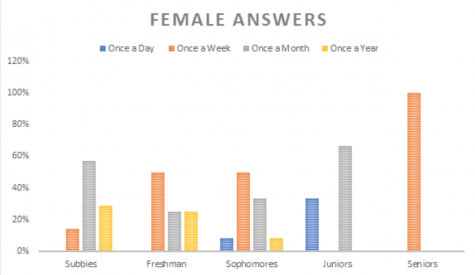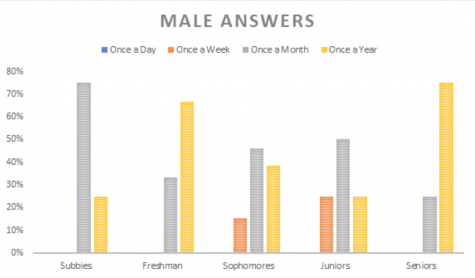A look into how often Uni students cry
Walking down the halls of Uni, a student will inevitably hear talk of crying. Crying is glorified by Uni students, almost as something to brag about. With students saying things like, “I cried for two hours last night” or posting about it on social media, crying has kind of become a way for students to show how hard they are working. Uni has a stressful reputation that seems to quantify the amount it seems that students cry. However, it is important to know how much students are actually crying and how many are just saying they are to feed into the stereotype. To find out, I conducted a study where I walked around the hallways asking people how often they cried. While I predicted that the amount of juniors crying would be slightly higher than other grades, I was astonished to see that approximately 30% of junior girls cry once a day. Along with other analyses from this study, this number was one specifically worth investigating as it is important for us to know what this data says about Uni.


Not surprisingly, the percentage of girls crying is much higher than the boys, as can be seen in the number of ‘once a year’ responses in the graph for boys. What pertains to Uni most is that we can see the frequency of crying tends to peak around sophomore and junior year. If we use crying as an indicator of stress, it makes sense that juniors tend to cry more as college becomes a large stressor in each person’s lives. However, 30% of junior girls crying everyday is extreme. Perhaps this heightened amount of crying does stem from the added pressure of Uni’s high standards for success set up by the student body. This reasoning would also answer why sophomores are included in this heightened amount of crying, as the pressure of classes and thinking of college tends to start at this time. Compared to other schools, it is safe to say that the numbers of juniors crying is exponentially heightened due to Uni’s social atmosphere of ideas of success in academics.
Junior Catherine Guo said, “I think pressure from family and school combined. And also Uni is such a small environment, I feel like it’s very hard to just find people you really connect with” is what causes her the most stress. Guo brings up another reason for why crying may peak in junior year that is unique to Uni compared to other schools. Uni is known for having a very small student body of roughly 300 students, so it makes sense that people tend to almost get too close with their classmates after a few years. While having such a small class size has its benefits of creating solid and long-term relationships, it can also cause people to want to branch out. After all, a healthy friendship does not include spending all your time with the same people everyday.
Since social issues seem to be the largest stressor for Uni students after academics, it is important to see if students are honest with each other about what they may be feeling, or if Uni does not facilitate an environment for that.
For many students, they feel comfortable discussing the topic with close friends they have made throughout the year.
Sophomore Maxine van der Donk says, “For the most part, I feel pretty comfortable talking to my friends about it and I know a lot of my friends won’t look down on me because we usually have the same issues.” On the other hand, others like Kevin Chen say, “We [my friends] don’t really talk about that [crying] because it doesn’t really seem relevant to us.” Thus, the opportunity to talk to others is present, but it is only a matter of whether you choose to take it or not. However, these answers still do not answer the question of whether Uni itself is a good way for people to support each other, even if they were not already friends.
Elias Finkleman says, “If it [the topic of crying] doesn’t come up naturally, and you ask, it doesn’t push development in friendship.” Consequently, it seems that it is really up to an individual student if they want to use their preexisting relationships as self-support. In agreeance, Maxine van der Donk says, “I don’t feel comfortable talking to other people because there is a stereotype that crying is weak.” Thus, it can be concluded that Uni is not a place where anyone can always easily feel comfortable talking to anyone about any issue, but a place where one has the opportunity to build relationships where they do feel comfortable.
Overall, it is safe to say that Uni students do cry more than the average highschool student based on the graphs. Whether they cry because of school, social vendettas, or other reasons, Uni has a unique environment to facilitate these feelings. For some, Uni has allowed them to make relationships that help through their tears. For others, Uni may be the source of their tears. Even if it is true that Uni students tend to cry more than expected of an average highschool, we also have to take into account that many exaggerate how much they cry in order to further the stereotype. While this stereotype is backed up with evidence, it is not as extreme as one may think from hearing what people talk about crying while walking down the hallways. So, the next time someone tells you that they ‘cried for three hours last night,’ make sure to take that statement with a grain of salt.
